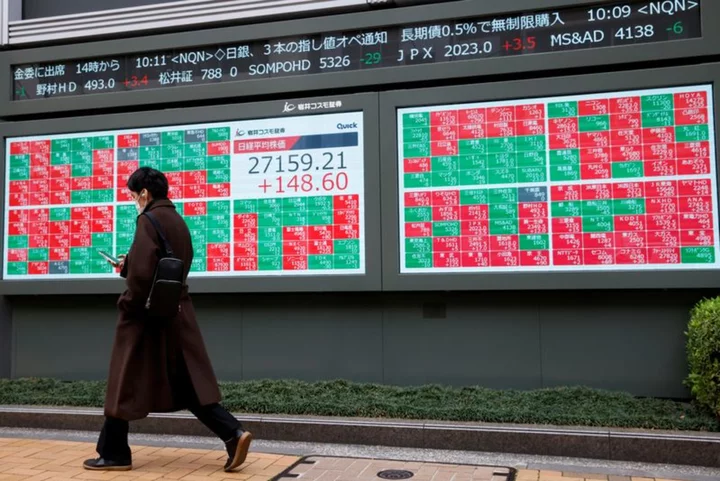By Scott Murdoch
SYDNEY Asia stock markets started to turn positive later on Monday even though investors in China sold off shares in property developers, remaining unconvinced by authorities' efforts to revive activity in the mainland real estate market.
MSCI's broadest index of Asia-Pacific shares outside Japan reversed earlier losses and was up 0.3%, after U.S. stocks ended the previous session with mild gains.
Australian shares gained 0.36% and Japan's Nikkei stock index slid 0.49%.
The yen appreciated sharply against the dollar after Bank of Japan governor Kazuo Ueda stoked hopes the central bank could soon see a shift away from negative rates.
The dollar on Monday dropped 1.12% to 146.16 yen and it remains some way off its high this year of 147.87 reached earlier this month.
In Hong Kong, the Hang Seng Index halved its loss from earlier in the day to be off 0.66% by the afternoon session, as investors remained wary of China's troubled property sector.
A more positive tone was seen across futures markets which pointed towards a better start for most major European indexes.
In early trades, Euro Stoxx 50 futures were up 0.26%, German DAX futures were up 0.17% and FTSE futures were up 0.29%
U.S. stock futures, the S&P 500 e-minis, were up 0.24% at 4,472.3.
Hong Kong's Hang Seng Property Index, a gauge of Hong Kong's top developers, was still down 3.24% while the mainland property index was off 1.9%. It was earlier more than 3% in the red.
"We need the property market to stabilize first in order for any meaningful kind of economic rebound to happen in China," said David Chao, Invesco's Asia Pacific market strategist.
In recent weeks China's authorities - including the housing ministry, central bank and financial regulator - have rolled out a series of measures, such as easing borrowing rules, to support the debt-riddled property sector, and there are some expectations for more steps to revive demand in major cities like Beijing, Shanghai and Shenzhen.
Hong Kong stocks were also dampened as e-commerce giant Alibaba Group dropped 2.5% on the surprise departure of outgoing CEO Daniel Zhang from its cloud unit.
China's bluechip CSI300 Index rallied during the session and was up 1.23% as investors expected more economic stimulus.
"In the near term investors are cautious towards China but we are quite encouraged that the policies have turned from more piecemeal to more targeted in the past few weeks, especially with property," said Marcella Chow, JPMorgan Asset Management market strategist said.
In the United States, the Consumer Price Index (CPI) for August, due out on Wednesday, is expected to rise 0.6% month-on-month for August, which would take the year on year rate to 3.6%, according to a Wells Fargo research note.
Investors are pricing in a 93% probability that the Fed will keep rates at current levels after its next meeting ends on Sept. 20 but only a 53.5% change for another pause at the November meeting, according to CME group's FedWatch Tool.
The yield on benchmark 10-year Treasury notes rose to 4.294% compared with its U.S. close of 4.256% on Friday. The two-year yield, which rises with traders' expectations of higher Fed fund rates, touched 4.9948% compared with a U.S. close of 4.984%.
The European single currency was up 0.3% on the day at $1.0709, having lost 1.09% in a month, while the dollar index, which tracks the greenback against a basket of currencies of other major trading partners, was down 0.23% at 104.61.
In China, there was an easing of deflationary pressures with consumer price index (CPI) rising 0.1% in August from a year earlier. That was slower than the median estimate for a 0.2% increase in a Reuters poll but much stronger than a 0.3% decline in July.
China also had its smallest drop in factory prices in five months. The producer price index fell 3.0% from a year earlier, in line with expectations, after a drop of 4.4% in July.
China's central bank yanked the yuan off a 16-year low against the dollar on Monday by setting a daily midpoint guidance rate with the strongest bias on record, signaling increasing discomfort with the currency's recent weakness.
In the spot market, the onshore yuan was changing hands at 7.3245 per dollar at 0210 GMT, after hitting 7.3510 on Friday, which as 6.1% down from the start of the year and a level last seen during the global financial crisis.
U.S. crude dipped 0.19% to $87.34 a barrel. Brent crude shifted into positive territory to be up 0.2% $90.80 per barrel.
Spot gold was trading slightly higher at $1,927.08 per ounce. [GOL/]
(Reporting by Scott Murdoch in Sydney; Editing by Edwina Gibbs & Simon Cameron-Moore)

